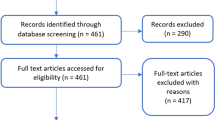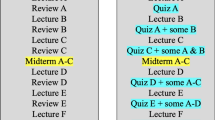Abstract
Adjunct questions are a common means to foster learning from instructional explanations. As the benefit of adjunct questions is mitigated if learner performance on them is low, it is also common to provide feedback as an add-on if learners fail to correctly respond to them. However, if adjunct questions are highly demanding, feedback might not only beneficially affect learning because it helps learners revise their comprehension difficulties; at the same time, it could also detrimentally affect learning by causing learners to invest less time in responding to subsequent adjunct questions, which lowers learner performance on these questions. This, in turn, could reduce learning outcomes. To address these potential detrimental effects of feedback, we experimentally varied whether N = 59 students received immediate feedback after they responded to highly demanding adjunct questions. We found that the feedback did indeed have detrimental effects: At least for the learners who perceived the task of responding to the adjunct questions as highly demanding, the feedback decreased both the time the learners invested in responding to the adjunct questions and their performance on them. This detrimental effect on the performance on the adjunct questions, in turn, entailed a detrimental effect on learning outcomes. We conclude that immediate feedback is not necessarily a beneficial add-on to adjunct questions in all situations.






Similar content being viewed by others
References
Agarwal, P. K., Karpicke, J. D., Kang, S. H. K., Roediger, H. L., & McDermott, K. B. (2008). Examining the testing effect with open- and closed-book tests. Applied Cognitive Psychology, 22, 861–876. doi:10.1002/acp.1391.
Berthold, K., Röder, H., Knörzer, D., Kessler, W., & Renkl, A. (2011). The double-edged effects of explanation prompts. Computers in Human Behavior, 27, 69–75. doi:10.1016/j.chb.2010.05.025.
Butler, A. C., Godbole, N., & Marsh, E. J. (2013). Explanation feedback is better than correct answer feedback for promoting transfer of learning. Journal of Educational Psychology, 105, 290–298. doi:10.1037/a0031026.
Cerdán, R., Gil, L., & Vidal-Abarca, E. (2011). Question-driven processing in single and multiple texts. In M. T. McCrudden, J. P. Magliano, & G. Schraw (Eds.), Text relevance and learning from text (pp. 295–318). Charlotte: Information Age Publishing.
Dunlosky, J., & Rawson, K. A. (2012). Overconfidence produces underachievement: Inaccurate self evaluations undermine students’ learning and retention. Learning and Instruction, 22, 271–280. doi:10.1016/j.learninstruc.2011.08.003.
Engeser, S., & Rheinberg, F. (2008). Flow, performance and moderators of challenge-skill balance. Motivation and Emotion, 32, 158–172. doi:10.1007/s11031-008-9102-4.
Hamaker, C. (1986). The effects of adjunct questions on prose learning. Review of Educational Research, 56, 212–242. doi:10.2307/1170376.
Hattie, J., & Timperley, H. (2007). The power of feedback. Review of Educational Research, 77, 81–112. doi:10.3102/003465430298487.
Hayes, A. F. (2013). Introduction to mediation, moderation, and conditional process analysis: a regression-based approach. New York: Guilford Press.
Hayes, A. F., & Matthes, J. (2009). Computational procedures for probing interactions in OLS and logistic regression: SPSS and SAS implementations. Behavior Research Methods, 41, 924–936. doi:10.3758/BRM.41.3.924.
Kalyuga, S. (2006). Assessment of learners’ organized knowledge structures in adaptive learning environments. Applied Cognitive Psychology, 20, 333–342. doi:10.1002/acp.1249.
Kalyuga, S. (2008). When less is more in cognitive diagnosis: a rapid online method for diagnosing learner task-specific expertise. Journal of Educational Psychology, 100, 603–612. doi:10.1037/0022-0663.100.3.603.
Kang, S. H. K., McDermott, K. B., & Roediger, H. L. (2007). Test format and corrective feedback modify the effect of testing on long-term retention. European Journal of Cognitive Psychology, 19, 528–558. doi:10.1080/09541440601056620.
McCrudden, M. T., & Schraw, G. (2007). Relevance and goal-focusing in text processing. Educational Psychology Review, 19, 113–139. doi:10.1007/s10648-006-9010-7.
Metcalfe, J. (2002). Is study time allocated selectively to a region of proximal learning? Journal of Experimental Psychology: General, 131, 349–363. doi:10.1037//0096-3445.131.3.349.
Metcalfe, J., & Kornell, N. (2003). The dynamics of learning and allocation of study time to a region of proximal learning. Journal of Experimental Psychology: General, 132, 530–542. doi:10.1037/0096-3445.132.4.530.
Muller, D., Judd, C. M., & Yzerbyt, V. Y. (2005). When moderation is mediated and mediation is moderated. Journal of Personality and Social Psychology, 89, 852–863. doi:10.1037/0022-3514.89.6.852.
Nelson, T. O., & Narens, L. (1994). Why investigate metacognition. In J. Metcalfe & A. P. Shimamura (Eds.), Metacognition: knowing about knowing (pp. 1–25). Cambridge: MIT Press.
Preacher, K. J., Rucker, D. D., & Hayes, A. F. (2007). Addressing moderated mediation hypotheses: theory, methods, and prescriptions. Multivariate Behavioral Research, 42, 185–227. doi:10.1080/00273170701341316.
Roediger, H. L., & Butler, C. (2011). The critical role of retrieval practice in long-term retention. Trends in Cognitive Sciences, 15, 20–27. doi:10.1016/j.tics.2010.09.003.
Roelle, J., Berthold, K., & Renkl, A. (2014). Two instructional aids to optimise processing and learning from instructional explanations. Instructional Science, 42, 207–228. doi:10.1007/s11251-013-9277-2.
Roelle, J., Lehmkuhl, N., Beyer, M.-U., & Berthold, K. (2015a). The role of specificity, targeted learning activities, and prior knowledge for the effects of relevance instructions. Journal of Educational Psychology, 107, 705–723. doi:10.1037/edu0000010.
Roelle, J., Müller, C., Roelle, D., & Berthold, K. (2015b). Learning from instructional explanations: effects of prompts based on the active-constructive-interactive framework. PLoS ONE, 10(4), e0124115. doi:10.1371/journal.pone.0124115.
Roelle, J., Schmidt, E. M., Buchau, A., & Berthold, K. (2016). Effects of informing learners about the dangers of making overconfident judgments of learning. Journal of Educational Psychology. doi:10.1037/edu0000132.
Sánchez, E., & García-Rodicio, H. (2013). Using online measures to determine how learners process instructional explanations. Learning and Instruction, 26, 1–11. doi:10.1016/j.learninstruc.2012.12.003.
Schworm, S., & Renkl, A. (2006). Computer-supported example-based learning: when instructional explanations reduce self-explanations. Computers & Education, 46, 426–445. doi:10.1016/j.compedu.2004.08.011.
Shute, V. J. (2008). Focus on formative feedback. Review of Educational Research, 78, 153–189. doi:10.3102/0034654307313795.
Vygotski, L. S. (1963). Learning and mental development at school age. In B. Simon & J. Simon (Eds.), Educational psychology in the U.S.S.R. (pp. 21–34). London: Routledge & Kegan Paul.
Acknowledgments
We would like to thank the students who participated in our study. Furthermore, we would like to thank Stewart Campbell for proofreading.
Author information
Authors and Affiliations
Corresponding author
Rights and permissions
About this article
Cite this article
Roelle, J., Rahimkhani-Sagvand, N. & Berthold, K. Detrimental effects of immediate explanation feedback. Eur J Psychol Educ 32, 367–384 (2017). https://doi.org/10.1007/s10212-016-0317-6
Received:
Revised:
Accepted:
Published:
Issue Date:
DOI: https://doi.org/10.1007/s10212-016-0317-6




